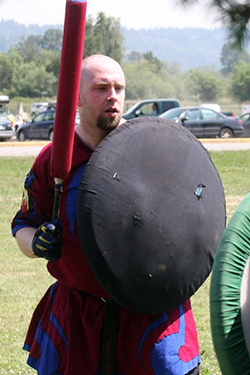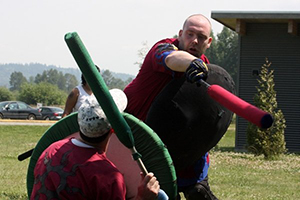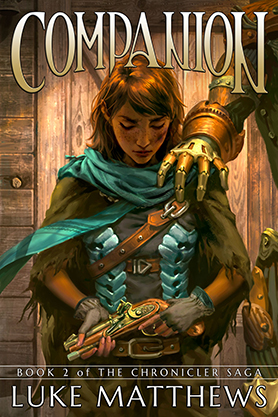I talk a lot about the book I’m writing. I finished the first draft of the book about 10 months ago, and I’m now on my 4th draft of the manuscript. Throughout that time I’ve been diving into research on the publishing industry, weighing my options for getting my book and its sequels published.
My initial idea, and the one I’m still technically following, was to attempt the traditional path first. Send out a ton of queries, find an agent, sell to a publisher, and get the book on physical shelves for a small advance. The advantage of this method is, quite simply, publicity. Having access to a solid editing staff is also a huge boon, but none of that matters if the book isn’t in front of faces. The traditional publishing route has more marketing reach than an individual author (unless that author is named King or Rowling).
Marketing a self-published book is – how can I put this mildly – insanely difficult. Trying to discern the best route for your meager advertising dollars is a brain-melting exercise, and one that may not even see any real results once you’ve figured it out. Getting anyone – even indie book blogs – to review your work is like herding cats, as most of them are already buried under months-long backlog and their submission requirements are getting stricter and stricter as time goes on.
So, while self-publishing might be easier and provide a more immediate, if smaller, return, there’s an almost ironclad guarantee that nobody will even see your book in the first place. Thus, you can’t really sell your book to anyone other than friends and family, sad trombone.
Then why am I now taking a serious lean toward self-publishing my first series of novels?
The short answer is that it feels right for me. I’m not writing a book for money or prestige. While it would give me an amazing heartswell to see one of my books on the shelf at Powell’s, that bit of bragging rights isn’t where my motivations lie. Nor have I ever harbored the illusion that I’d ever be a millionaire playboy philanthropist author. I’m not Richard Castle.
I have stories in my brain, and I want to tell them. I’ve probably forgotten more stories over my life than I’ve saved, mostly because I never really thought about writing them down until the last several years. Writing a book has been exhilarating for me, and I just want it out there, where people can read it. So, when I read a ton of articles from both successful and not-so-successful self-published authors, it’s hard to discern which path is the right one.
In almost every case of someone who’s not an author, the “correct” path is determined by potential financial gain. The idea is that self-publishing is akin to painting a diamond grey and throwing it into a gravel pit expecting someone to find it later. And, to some degree, that’s true. Bestsellers are virtually always backed by a publisher, even if they were self-published first (ala Fifty Shades of Grey).
But if financial gain isn’t really the goal, which is the better option?
That question is harder to answer. The vast majority of fiction authors have other means of income – usually centered around writing, yes, but it’s not their books alone. So finances aren’t really a concern for me, because even if I get traditionally published there’s no guarantee that I’ll even get a “living wage” off of whatever advance I might find as a new author.
And, once you take the money out of the equation, there are a few things that might be deal breakers for me when it comes to traditional publishing. First, is the publishing industry’s notorious reputation for being glacially slow. The time frame from securing an agent to seeing your novel published is measured in double-digit-months, and sometimes years. Second, most publishers want an ironclad non-compete clause in their contract. This prevents authors from doing any kind of work on the same property in any other form – such as digital shorts, stories in fiction magazines, or novellas published through other means. Third, the author has almost no control over subsidiary rights – like foreign language editions or film rights. So I, as the author, have little-to-no say in who makes a movie of my book, if that route becomes a reality.
But most important, for me, is creative control. In this particular instance we’re not talking about a single novel. It’s not a thriller or a romance novel or a dystopian YA book – it’s an epic fantasy series. Series. I’ve already got the framework for 3 ½ books planned, and I know how the whole series is supposed to end. Getting a contract for a potentially 5-book series at a traditional publisher, for a first-time author, for an epic fantasy series, is nigh-impossible. The contract side isn’t a discouragement, though, it’s the simple idea that I might not be able to see the series through like I want to, even though this story’s been in my head for over a decade.
No one should think that I’m saying this because I’ve been rejected too many times. Every major famous author has stories about how many times they were rejected before they sold their first manuscript, and I’m not close to the 50-100 range that many of them are (I’ve been rejected 10 times). So, when I say that I’m leaning toward self-publishing this bad-boy, it’s because I think it might just be the right path for me.
The creative control, the freedom from contracts, the bigger royalties, and the flexibility of distribution are all very attractive to me. It means that I’ll have to put in a metric fuck ton more work than if I had a publisher at my back, but I ain’ scurred. Just know that for brief periods of time during the process you’ll see me turn into a straight-up shill, and I am absolutely not afraid to beg for word-of-mouth publicity.
I said before that I hadn’t made a final decision on which path to take, but it looks like I’m pretty close. And the closer I get to finishing my 4th (and I hope final) draft, the more pressing that decision becomes. We’ll see.





